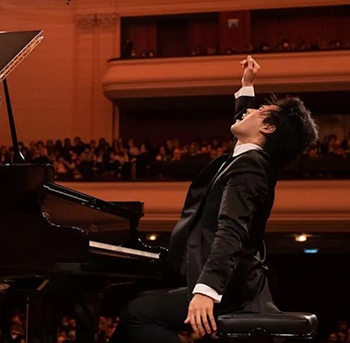By Daniel Hathaway
. Weekend concert agenda (by category)
. Maltz Family Foundation gifts $10 million to Blossom, Memory is a muscle, writes Angela Hewitt
. Almanac: highlighting Michael Daugherty, “Duke” Ellington & Robert Shaw
HAPPENING THIS WEEKEND (BY CATEGORY):
Orchestras: The Cleveland Orchestra continues its set featuring the premiere of Wynton Marselis’s Trumpet Concerto (Michael Sachs, Franz Welser-Möst on the podium, Friday at 7:30 & Saturday at 8), the Oberlin Sinfonietta and Oberlin Chamber Orchestra perform on Friday at 7:30, the Cleveland Women’s Orchestra makes its 88th annual trip to Severance (Jungho Kim conducting, with cellist Dane Johansen in the Dvořák Concerto, Sunday at 3:30), and the Canton Symphony and Chorus present a program featuring the Dvořák Requiem (Gerhardt Zimmermann, conducting, Sunday at 7).
Choruses: The Singers Club of Cleveland preview their European tour program (Friday at 7), Steven Plank directs the Oberlin Collegium Musicum (Saturday at 7:30 and Sunday at 8), and the West Shore Chorale sings Brahms’ German Requiem with orchestra (Michael Lisi, conducting, Sunday at 7:30).
Pianists: Chopin Competition gold medalist Bruce Liu (pictured) plays on Oberlin’s Artist Recital Series (Sunday at 2:30), and Keyboard Conversations with Jeffrey Siegel offers music by Mozart & Friends (Sunday at 3).
Small Ensembles: Heights Arts Close Encounters presents clarinetist Afrendi Yusuf & colleagues in Bartók and Brahms (Sunday at 3), Church of the Western Reserve hosts Factory Seconds (Cleveland Orchestra members Jack Sutte, trumpet, Jesse McCormick, horn, and Richard Stout, trombone (Sunday at 4).
Family Concert: Arts Renaissance Tremont presents the North Coast Winds, in a program that includes Margaret Brouwer’s Daniel and The Snakeman (Sunday at 4).
Composers meet Flutes: the Greater Cleveland Flute Society presents a Composers Connection concert at West Shore Unitarian Universalist (Sunday at 7).
CLEVELAND ORCHESTRA NEWS:
On Thursday, The Cleveland Orchestra announced a $10 million gift from The Milton and Tamar Maltz Family Foundation to support improvements and future development of Blossom Music Center, the Orchestra’s summer home.
“This generous gift will fund infrastructure renovations and operating needs for this beloved 55-year-old music venue, located in the Cuyahoga Valley National Park. Projects currently include new Pavilion seating and VIP box upgrades, improved lighting and signage, as well as the creation of a rideshare parking lot. The Cleveland Orchestra will also use some of the funding to develop a long-term plan aimed at transforming the guest experience at Blossom Music Center, for a refreshed strategic vision of this important venue.”
INTERESTING READ:
In an article in The Guardian, British pianist Angela Hewitt considers how to keep a large body of pieces memorized as she ages.
On the whole, I’ve been blessed with an excellent memory – I suppose some would even say prodigious as I’ve performed the complete solo keyboard works of Bach (the exception being The Art of Fugue), the 32 sonatas of Beethoven, and who knows how many millions of other notes from memory over the years. I always thought it would have been a good idea to measure my brain before I memorised all that Bach and then again after to see how it had developed and changed. Too late now. At the age of 64, it’s definitely shrinking, and memorising has become a very conscious, frustrating and time-consuming activity. But I stick at it because memory is a muscle that needs to be constantly used to stay in any sort of shape.
Read the article here.
WEEKEND ALMANAC:
April 28, by Daniel Hathaway
Iowa-born, Grammy-winning University of Michigan faculty composer Michael Daugherty turns 69 today. One thing that’s interesting to note before listening to his work is that all the way back to his childhood in Cedar Rapids, his life has been abundant with musical variety and pop-culture influence. His dad was a jazz and country-music drummer, his mom was an amateur singer, and his grandma played piano for silent films.
Responsible for a few of his Grammys through a recording by the Nashville Symphony, Daugherty’s five-movement, forty-minute, Superman-inspired Metropolis Symphony makes all those genre influences evident with a mix of jazz, rock, funk, avant-garde, and symphonic music. Listen to the Nashville recording here — and take a moment to enjoy the album’s cover art.
Another piece not to be missed is Daugherty’s Dead Elvis for bassoon and ensemble. The theater of it is just as important as the music, so when you click here to watch the first movement in a performance by TK DeWitt (at the time a student at Rice, now a member of the Kansas City Symphony), make sure not to skip over all the shenanigans that take place before a single note has been played.
April 29, by Mike Telin
Born in Washington D.C. in 1899, Edward Kennedy “Duke” Ellington would go on to become a celebrated composer, pianist, and band leader. During his long career, Ellington garnered a national and international profile through his orchestra’s appearances at Harlem’s Cotton Club and on European tours.
In 1989 Gunther Schuller wrote: “….[Music was Ellington’s] total life and his commitment to it was incomparable and unalterable. In jazz he was a giant among giants. And in twentieth century music, he may yet one day be recognized as one of the half-dozen greatest masters of our time.” Click here to listen to Ella Fitzgerald sing Ellington’s Mood Indigo.
April 30, by Daniel Hathaway
Before moving on to the Atlanta Symphony, conductor Robert Shaw (born on April 30 in 1916 in Red Bluff, Iowa) served as George Szell’s assistant with The Cleveland Orchestra, where he prepared the Orchestra Chorus for many performances while also maintaining his own professional ensemble, The Robert Shaw Chorale. In celebration of his centenary, Carnegie Hall made a series of documentaries showing how Shaw prepared for performances of major choral works. In this episode, he rehearses and conducts excerpts from Benjamin Britten’s War Requiem with the Orchestra of St. Luke’s, soprano Christine Goerke, tenor Richard Clement, baritone Benjamin Luxon, the Robert Shaw Festival Chorus, Robert Shaw Institute Singers, and the American Boychoir.




